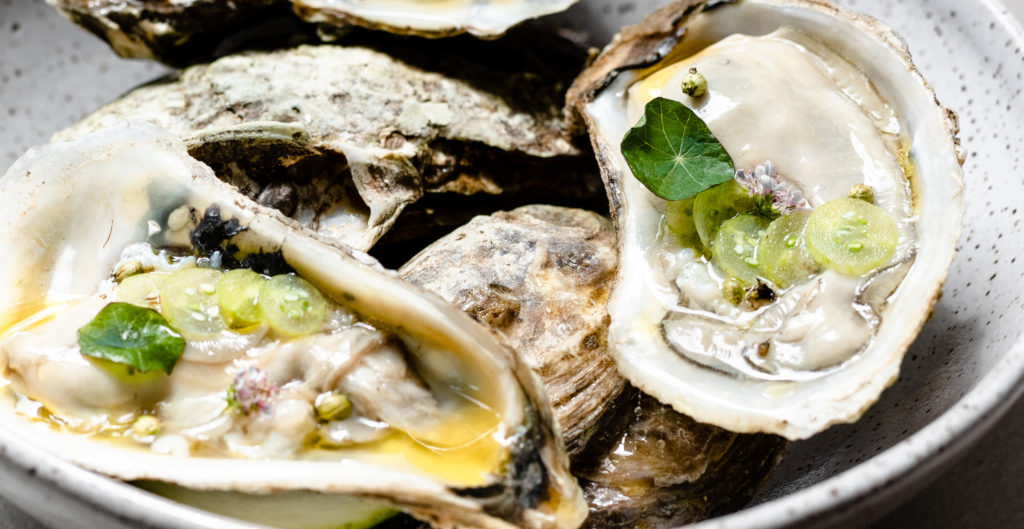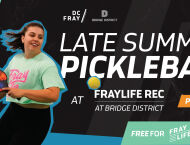Eat
 Photos: courtesy of Oyster Oyster
Photos: courtesy of Oyster Oyster
Oyster Oyster Joins Sustainable Dining Scene, Pushes for New Movement
October 4, 2019 @ 12:00am
Oyster Oyster grew out of a dream. Not just a vision for the future of the restaurant, but a disturbing image chef Rob Rubba conjured during slumber. He dreamt that his daughter fell while hiking and broke her leg.
“When I looked at her leg, it looked like a piece of chicken thigh or chicken leg,” he recalls. “It really grossed me out, and I was like, ‘Well, I would never eat my child. Why would I eat an animal?’”
He went cold-turkey vegetarian after that.
“It’s a little dark, but it’s an interesting illustration of this formative moment,” owner Max Kuller, who has been a vegetarian for his entire adult life, says with a laugh.
Rubba’s nightmare aside, Oyster Oyster – opening in Shaw next month – has been a long time coming. The two plant eaters had wanted to create a restaurant focused on vegetables, and the idea solidified after reading an article in Saveur Magazine that outlined the future of dining given the bleak realities of climate change.
“It was really centered around mushrooms and bivalves,” Rubba explains. “Both of them are extremely sustainable proteins and easy to produce and use almost no resources to create. From there, it just kind of stemmed off and kept growing.”
Kuller adds, “I think there was this real ‘a-ha’ moment for us when we were exploring this idea of a quote unquote vegetarian restaurant. If we frame this around sustainability instead, we can still be very much true to our ethos and our philosophies.”
That’s how oysters – and mussels – wriggled their way into Kuller and Rubba’s vegetarian diets.
“It was brought to my attention by Max originally because I had noticed he had started eating oysters,” Rubba says. “One day I was on his Instagram and I was like, ‘Why is this guy eating oysters? I thought he was vegetarian?’”
Rubba learned that oysters don’t feel pain like humans and animals because they lack a central nervous system and brain. The language used to describe an oyster’s lifecycle is also more plant-like than animal-like: they grow from seed, latch onto reefs and never move. On top of that, raising oysters is incredibly sustainable. Oyster farms have very little negative impact on the environment, and they are in fact used to improve water quality.
Kuller describes his first time trying oysters as a magical experience. Beyond the ethical and ecological rationale, he grew to love these bivalves because of their kinship with grapes and wine.
“I became incredibly fascinated with oysters as a sommelier because oysters also have ‘merroir.’ They reflect where they’re from in a way that no other protein I know of does.”
With that knowledge, it all started to click.
“That ability to kind of gerrymander oysters and mussels into a plant-based concept, it really is like we can pretty much have everything we want,” Kuller says.
Oyster Oyster’s driving philosophy is sustainability, with extra attention paid to sourcing and waste reduction. Instead of a blanket statement about a sourcing radius or set of requirements, Kuller and Rubba prefer to take everything on a case-by-case basis.
“We certainly favor Chesapeake oysters and we certainly favor relationships direct with farmers when we’re sourcing oysters,” Kuller says. “But we’re not going to try to claim that we’re only going to ever use a local oyster because the reality may be, based on the farming season and what’s going on, we may want to go further into the Northeast occasionally.”
The same goes for wine – natural, organic and local wines will be featured, but not to the exclusion of up-and-coming producers who are working hard to grow responsibly but may not be certified. Rubba is working to eliminate both food waste and plastic waste in the kitchen.
“I had always used sous-vide [low-temp, long-time cooking using plastic pouches],” he says. “I made the decision a long time ago that we weren’t [going to] because I just don’t know where these bags go.”
Plastic wrap and other disposables are also being kicked out of the kitchen. For organic material, the beverage program was a natural outlet for scraps and trimmings. That’s an opportunity to shine for Adam Bernbach, the bar director at Kuller’s Spanish restaurant Estadio.
“Collaboration is what excites me,” Bernbach says. “A lot of it is thinking about what we’re doing, and Rob’s food. I’m trying to do more closed-loop kind of things and using more of the resources that we have available to us.”
That led him to experimenting with low-ABV beverages like aromatized wine and “taking that template and those traditions and using [them] as a way to utilize the ingredients that are trimmings, but also as a way to highlight what the cuisine is.”
These drinks will make up an alternative beverage pairing option in addition to a more traditional wine pairing – “stuff that you would see in someone’s home, pre-modernization.” Expect infusions of herbs, vegetables, fruits and “anything that’s consumable that would be used in cooking.” The food will be offered exclusively as a three- or four-course tasting menu.
“I feel the best way to show a meal that’s based around plants and oysters wouldn’t be ordering à la carte,” Rubba says.
Each menu will start with light canapes followed by slightly larger dishes, then robust entrées and ending with playful desserts – sans refined sugar. Of course, oysters and mushrooms will feature prominently. One composed oyster preparation includes fresh-pressed black walnut oil, cider and radishes. There will also likely be a whole roasted oyster mushroom on the menu in some form.
“Another fun dish that we’ve been experimenting with and [are] very happy with is our carrot steak,” Rubba adds.
It involves dozens of layers of slow-roasted carrot tightly rolled together, paired with roasted farro, fermented fennel and a vegetable demi-glace.
“I believe that dish is one that could change people’s perception of what a vegetable can be.”
In addition to meticulous sourcing, Rubba is also taking some ingredients into his own hands.
“We want to press our own oils out of nuts and things like that because we know where it’s coming from, and then we [can] upcycle what comes out of that. It’s important to have a purpose for everything.”
He’s also growing and dehydrating plants for the menu, like coriander berries to make coriander capers, fennel crowns to be pickled and marigold flowers to use in a farmhouse curry in place of turmeric. They have plans to make their own bread and butter, and potentially even mill their own grains for flour or grow their own mushrooms in the restaurant down the road. The menu will change six times a year in tandem with six seasons that Kuller and the team have delineated.
“We want to have these six special seasons that we’re thinking about in their own ways, where we’re adding things that are – to us – special about those times of the year,” Kuller says.
They plan to open at the beginning of holiday season, which runs from the middle of November through the end of December. This season will celebrate special or luxury items. Then comes mid-winter in January and February, playing with preserved items and root vegetables. The subsequent seasons highlight the produce available exclusively during that time of year: early spring, late spring and mid-summer. Harvest season, from September through mid-November, showcases the bounty of the harvest.
The restaurant is located in the City Market at O development in Shaw. It will be intimate, with just 35 seats inside and a covered outdoor annex they’re calling the Oyster Garage because it used to be the entrance to a parking garage.
“It’s a simple space,” Kuller says. “I would say it definitely has a little bit of a minimalist vibe.”
Gray, white, pink and soft green hues pair with wood, natural materials and living greenery.
“There’s a lot of reclaimed things,” he adds.
The back bar is made from recycled skateboard decks and there is a mosaic of weathered tiles that Kuller personally harvested from a beach in Italy. After many long months of development and construction, the Oyster Oyster team is more than ready to enter the sustainable dining scene.
“The underlying trends are staggering,” Kuller says. “There’s moments where we’re worried we’re behind the trend. We started by thinking, ‘Okay, we are totally on the forefront of this,’ but we feel like every time we open our browser now, it’s another chef who’s like, ‘Okay, we’re going to go vegetarian for a month or we’re going to focus on high-end veggie dining.’”
Rubba says he doesn’t think there’s really any other way to operate a restaurant.
“If you look in a 10-year span, it’ll be too expensive,” he continues. “You just financially could not run a restaurant with the prices you have now 10 years from now. For us to sustain living here and having restaurants and living comfortable lives, we have to change how we operate restaurants and create new concepts. We don’t have a choice.”
Kuller hopes that this is just the beginning of a movement.
“We’d love to ultimately teach things about technique in terms of reducing food waste. We’d love to be able to teach workshops on foraging, even urban foraging. It’s not about trying to carve out this thing and be special and unique. We want more restaurants like us.”
Oyster Oyster: 1440 8th St. NW, DC; www.oysteroysterdc.com







